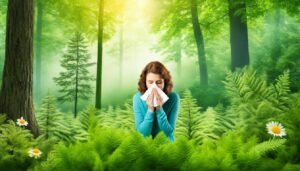Allergies hit over 60 million Americans each year. They bring itchy, watery eyes, sneezing, coughing, and more.1 This article dives into natural and home remedies for seasonal allergies or hay fever. You’ll learn about common allergens, how to avoid them, and natural ways for relief. The article will discuss using home remedies, treatments, and supplements to fight allergies the natural way. Our aim is to share a guide that helps you manage allergies without relying on strong medicines.
Key Takeaways
- Allergies affect over 60 million Americans annually, causing bothersome symptoms
- Natural remedies like saline rinses, butterbur, and acupuncture can provide effective allergy relief
- Identifying and avoiding allergen triggers is the first step in natural allergy management
- Supplements like spirulina, vitamin C, and vitamin D may help reduce inflammation and symptoms
- Essential oils such as peppermint and frankincense can offer additional natural support
Understanding Allergies
Allergies happen when the body reacts to harmless things like pollen, dust mites, pets, or molds.2 The body releases histamines to defend itself.3
Common Allergens
Allergens can be pollen from trees, grasses, and weeds. Also, dust mites, pet dander, and mold spores.3
Allergy Symptoms
Allergies can cause sneezing, a runny nose, and itchy eyes. There can also be rashes, swelling, and asthma.3 Knowing what causes allergies and their symptoms is key to finding relief.
| Key Statistic | Source |
|---|---|
| More than 60 million people are affected by seasonal allergies each year. | 2 |
| Studies of acupuncture for the treatment of allergies have shown mixed results, with the most rigorous studies showing very modest clinical benefit. | 3 |
| Children under a year old should never be given honey. | 3 |
| HEPA filters capture fine, pollen-sized particles and are recommended for controlling allergies. | 3 |
| Regular vacuums can blow allergens back into the air, indicating a need for HEPA filters in vacuum cleaners. | 3 |
| Studies show that quality air filtration, such as HEPA (high-efficiency particulate air) filters, can reduce airborne allergens and potentially relieve allergies. | 2 |
| Opting for high water content foods like berries, cucumbers, and broths can help boost fluid intake and relieve allergy symptoms. | 2 |
| Quercetin, found in various fruits and vegetables, has been shown in clinical trials to reduce airway irritation with allergies. | 2 |
Avoidance: The Best Natural Remedy
The top way to deal with allergies is by avoiding what causes them, like allergen avoidance. It means steering clear of certain allergens to dodge their effects.2 For example, you might stay inside on high pollen days, keep windows shut, use air conditioning, and wash pollen off by showering at night.1 Figuring out what you’re allergic to and staying away from it is key to staying symptom-free.
| Avoidance Strategy | Benefits |
|---|---|
| Avoid outdoor activities during high pollen counts | Reduces exposure to airborne allergens |
| Keep windows closed and use air conditioning | 2 Quality air filtration can reduce airborne allergens and potentially relieve allergies |
| Remove shoes upon entering the home | Prevents tracking in outdoor allergens |
| Shower before bedtime | Washes off accumulated pollen and allergens |
To stay ahead of your allergies, avoid what sets them off.2 Over 60 million Americans suffer from seasonal allergies yearly. It shows how important it is to know and steer clear of your allergy triggers.

Home Remedies for Allergies
Plenty of home remedies help lessen allergy symptoms naturally.1 Using a neti pot or saline solution for nasal irrigation can clear mucus out. It also washes away allergens.4 Filters like HEPA are great for getting pollen, dust, and pet dander out of your air. This means you breathe cleaner air indoors.1 Butterbur, a plant-based remedy, works just as well as some medicines for itchy eyes.1 For swelling and better breathing, try Bromelain. You find this enzyme in pineapples and papayas.
Saline Nasal Irrigation
Using a neti pot or saline solution can relieve allergy symptoms by cleaning out your nose.4 Making sure to use and clean these tools properly is key to their success.
Air Filters
HEPA filters catch many irritants in the air, like pollen and dust.4 This makes the air indoors cleaner. It’s a big help for those with allergies.
Butterbur
1 Butterbur is a great natural choice for itchy eyes. Studies show it’s as effective as some allergy medicines.
Bromelain
1 Pineapples and papayas’ Bromelain reduces swelling and helps you breathe better. It’s good for allergy symptoms.
Natural Allergy Relief Treatments
There are natural ways to relieve allergies. These treatments might help allergy sufferers feel better.
Acupuncture
Acupuncture has been seen to work well for both seasonal and year-round allergies. Many studies have found it effective.1A 2015 review of 13 studies showed acupuncture’s benefits. It helped with both types of allergic rhinitis.3Yet, results from studies vary. The strongest studies show only small benefits.
Probiotics
Probiotics could make allergic rhinitis symptoms better. They work by improving gut health and how the immune system works.1In 2015, a review of 23 studies backed this up. It found that probiotics could indeed help.
Even though more science is needed, some people say probiotics work for them.
local honey
Local honey might reduce your reaction to local pollens. It’s thought to help the body get used to the pollen.
Environmental Controls
Keeping the indoor environment in check helps cut down on allergy triggers.
Air conditioners and dehumidifiers lessen moisture, stopping mold and mildew from growing. This helps control allergy signs.5 They lower humidity, making it hard for allergens to spread.6
Air Conditioners and Dehumidifiers
A research study looked at how well air purifiers reduced pollen.5 It found that they were good at fighting Artemisia-pollen allergies in a big clinical trial.5 By managing indoor temperatures and moisture, these machines can make the air better. They also lower the chances of being exposed to common indoor allergies.6
Supplements for Allergy Relief
Looking into natural options for fighting allergies?7 Some supplements might just do the trick.7 Spirulina, a kind of blue-green algae, shows it can help against allergy symptoms.7 Stinging nettle is known for being a nature-based antihistamine.8 Quercetin is a compound found in various fruits and veggies.7 It can help manage allergies by stabilizing histamine release.7 Taking more Vitamin C could also decrease histamines and ease symptoms.
Spirulina
In a 2020 study, spirulina was tested against the common antihistamine cetirizine.7 Results? Spirulina improved allergy symptoms better in allergic rhinitis patients.
Stinging Nettle
Nettle is a known natural antihistamine that might help allergy sufferers.8 Its use for allergy relief goes way back, though human studies are few.
Quercetin
8 Quercetin might reduce allergy risks, especially allergic respiratory issues like asthma.7 In 2020, it was highlighted for its antihistamine and anti-allergy effects.
Vitamin C
In a review, vitamin C showed potential against allergies and immune problems, thanks to its anti-inflammatory and antioxidant properties.7 A 2018 study noted its antioxidant effects.8 Combining it with exercise improved allergy symptoms significantly.8 Vitamin C is usually safe, with only a few reporting side effects like mild stomach issues.
Essential Oils for Allergies
Essential oils are a natural help for allergy symptoms. They can offer relief to the 40 to 60 million Americans impacted by seasonal allergies every year in the U.S.9. Oils like peppermint, basil, and eucalyptus can soothe symptoms.9
Peppermint Essential Oil
Peppermint oil stands out for its ability to reduce allergies due to its anti-inflammatory effects. It was part of a study where it showed to calm spasms in the trachea.9
Eucalyptus Essential Oil
Eucalyptus oil fights inflammation and might ease congestion from allergies.10. Also, it works as a germ-killing agent which can be useful in laundry during allergy season.9
Frankincense Essential Oil
Frankincense might help with year-round allergic rhinitis10. An experiment noted that a mix of sandalwood, frankincense, and Ravensara could improve its symptoms.10
Always be careful with essential oils. Ensure they’re diluted and test on your skin first. They are not regulated by the FDA for purity, so use only good quality ones. Follow usage instructions closely.10
Precautions with Natural Remedies
Natural remedies can help with [side effects of natural remedies] and allergy symptoms. But, they can also carry risks.1 Be careful using these treatments. They might not mix well with certain drugs. Or, they could make some medical conditions worse.1 Don’t use home remedies for severe allergies. These cases need quick medical care.11
The U.S. FDA doesn’t check essential oils for purity or quality.1 So, it’s crucial to use them the right way. Always test them on your skin first. And talk to a doctor before starting any new natural remedies for [cautions for severe allergic reactions].1
Medicine and natural treatments can work together. But, natural remedies should not replace a doctor’s advice. If your allergies are serious or won’t go away, see a doctor. They can help you manage your condition safely and effectively.
Allergy-Proofing Your Home
Want to home allergy prevention and cut down reducing indoor allergens? Simple steps go a long way. Keep windows closed when pollen is high12. Use HEPA air filters and clean with a HEPA vacuum13. Don’t forget to dust often. Also, try to keep pets out of the bedroom. Taking off shoes when you come in and showering before you sleep stop outdoor allergens from coming in.
Keep your home’s temperature between 68 F (20 C) and 72 F (22 C). Try to keep the humidity lower than 50%13. This helps stop dust mites and mold from growing. Having an exhaust fan in your bathroom helps lower moisture too13.
Choose washable curtains like cotton or synthetic ones13. Clean your floors regularly. Use a damp mop for wood or linoleum and vacuum carpets often13. Bathing your pets weekly can also cut down on dander, which carries allergens13.
By combining lots of these methods, you can make a big difference. You’ll improve the air in your home, which is great news for people with allergies.
Helpful Foods for Allergy Relief
Some foods can naturally help those with allergies. Spicy foods, like chili peppers, thin mucus and clear congestion.14 Honey, especially if it’s from local sources, might reduce allergy symptoms.15,16 Foods high in vitamin C, such as citrus fruits, berries, and leafy greens, boost the immune system. They also help lower histamine levels. An anti-inflammatory diet with these foods can ease allergy symptoms.
14 Foods rich in Omega-3, like tuna and salmon, could protect against allergies.14 Magnesium, found in nuts like almonds and cashews, helps fight inflammation and stress. It also keeps your blood pressure and insulin in check.15,16 Turmeric, which contains curcumin, reduces inflammation-driven disease symptoms. It may help with allergic reactions.
14 Apples, rich in quercetin, and other items like berries and onions are good for fighting allergies. They work due to their anti-inflammatory, antioxidant, and antiviral benefits.15,16 Onions, especially raw red onions, are a top source of natural antihistamines. They can ease seasonal allergy symptoms.
15 Eating lots of vitamin C can lessen allergic rhinitis. This is the irritation of the upper respiratory tract by plant pollen.14 Oranges, broccoli, and strawberries are loaded with vitamin C. They boost your immune system.
15 Studies show bee pollen fights inflammation and microbial infections. It prevents allergic reactions by blocking mast cell activation.16 The National Center for Complementary and Integrative Health says there’s no solid proof that honey can treat seasonal allergies. However, some people use locally sourced honey and pollen for this purpose.
natural allergy relief
Natural allergy relief takes a big picture view. It’s about more than just getting rid of symptoms. It looks closely at why allergies happen and what triggers them. Then, it suggests natural ways to avoid these troubles. This way, each person can create a plan that fits their needs best. They use holistic allergy management, not just harsh medicines.3 This method helps people live better by making thoughtful choices.1
Allergies come when our body reacts to things a different way. To deal with allergies well, it’s important to look at the real reasons behind them. This means using a mix of avoiding what triggers us, at-home solutions, natural treatments, and extra nutrients. It’s an integrative allergy treatment that helps for a long time. It offers total care for better living.31
It’s good to have a variety of methods ready for managing allergies. Things like rinsing your nose with saline and using special air filters can help a lot. So can adding certain bacteria and using smells from plants. Mixing these allows people to find what works just for them. And this helps them feel better and live with fewer symptoms.31
Protection Against Allergens
Staying away from allergens is key for natural allergy relief. This means watching pollen levels, not going outside much when pollen is high, keeping your windows shut, and using AC. It also means taking off your shoes when you come in and having a shower before sleeping to get rid of allergens.2 All these steps help you keep allergies in check naturally.
Using quality air filters is proven to lower allergens in the air, possibly making your allergies better.2 Picking HEPA filters can really help. But some researches don’t agree that HEPA filters do much because allergens are often found on surfaces.3
Drinking lots of water is not just good for you; it can also help with alleviating allergy symptoms.2 Eat foods rich in vitamin C to keep your immune system strong. Doing sinus rinses with salt water can clear your nose and remove allergens.2
Following these steps and reducing your allergen exposure can really help manage your allergies naturally. But, it’s smart to talk to a doctor before trying new things, especially if you are already taking medication or have health issues.3
Saline Sprays
Saline nasal sprays are easy to find in stores. They work well for natural allergy relief. These sprays wash out stuff like pollen and mucus from your nose. This helps you feel better temporarily if you have allergies.17 These sprays have the same salt level as your body.17 Some research shows they make mucus thinner, lower postnasal drip, and clear out allergens.17 They also keep the small hairs inside your nose healthy. This is good for conditions like rhinitis and sinusitis.17
Using saline sprays the right way can help reduce allergy symptoms.18 Saline solution mixes water with salt. You can find saline in different types for your nose, like sprays and drops.18 These sprays make mucus thinner. This lets air move through your nose easier.18 Saline is good for many problems, like dry nose, allergies, and sinusitis.18
19 They have no medicine, so you can use them a lot.19 Saline has the same salt level as our bodies.19 Some studies show that saline sprays work well for allergy symptoms. They can make life better for people with hay fever.19
17 To make saline at home, mix salt, baking soda, and water. Talk to your doctor before using it.17 They can help you use it the right way for you.
19 Over-the-counter saline sprays are inexpensive.19 They’re mostly safe, but they might sting or make your nose dry. This is because of preservatives.19 If you use too much, it can make your nose run. So, use it carefully.19
19 You can make a saline spray at home with salt and water. There are steps to make sure it’s safe.19 There are also nasal sprays with medicine for different nose problems. They have different effects and risks.19 Be careful not to use decongestant sprays for more than three days. This helps prevent making things worse.19
Conclusion
This guide has looked at many natural and home remedies for natural allergy relief. It discussed avoiding allergens and using natural methods. This includes treatments, supplements, and essential oils.20 Understanding allergens and finding what works best helps people create a personalized strategy.21 The aim is to mix different approaches for longer-lasting relief.5
Mixing ways to avoid allergens, along with home and natural treatments, helps allergy sufferers. This could include using nasal irrigation or getting a HEPA air filter. Trying out what works for you is important.2021 This way, you can find the best natural remedies for your own situation.
However, it’s crucial to be safe with natural remedies, especially for bad allergies.20 Integrating various methods can help you live your life fully. You can enjoy being outside without worrying about allergies taking over.
FAQ
What are the most common allergens?
What are the typical symptoms of allergies?
How can I avoid exposure to allergens?
What are some effective home remedies for allergies?
Can natural treatments like acupuncture and probiotics help with allergies?
How can environmental controls help with allergies?
What supplements are recommended for natural allergy relief?
Can essential oils be used for allergy relief?
Are there any precautions to consider with natural allergy remedies?
How can I allergy-proof my home?
What foods can help with allergy relief?
Source Links
- https://www.healthline.com/health/home-remedies-for-allergies
- https://www.dedicated.care/articles/best-natural-remedies-seasonal-allergies
- https://www.webmd.com/allergies/allergy-relief-without-drugs
- https://www.cigna.com/knowledge-center/natural-remedies-for-seasonal-allergies
- https://www.ncbi.nlm.nih.gov/pmc/articles/PMC8638355/
- https://www.webmd.com/diet/features/allergies-allergy
- https://www.medicalnewstoday.com/articles/323276
- https://www.goodrx.com/conditions/allergies/supplements-for-allergies
- https://www.southfloridasinusandallergy.com/best-essential-oils-to-ease-your-allergies
- https://www.healthline.com/health/essential-oils-for-allergies
- https://www.myallergydr.com/natural-remedies-for-allergy-relief-elgin-il/
- https://www.wyndly.com/blogs/learn/how-to-stop-allergies-at-home
- https://www.mayoclinic.org/diseases-conditions/allergies/in-depth/allergy/art-20049365
- https://www.bswhealth.com/blog/the-best-foods-to-help-you-fight-allergies
- https://www.healthline.com/health/seasonal-allergies-best-foods
- https://www.entandallergy.com/blog/2020/may/9-foods-that-may-help-ease-your-allergies/
- https://www.webmd.com/allergies/saline-spray
- https://blog.walgreens.com/health/allergy/saline-nasal-spray-a-natural-alternative.html
- https://www.verywellhealth.com/saline-spray-snoring-allergies-3015306
- https://getcurex.com/blog-posts/the-best-remedies-for-natural-allergy-relief
- https://lakewoodschiropractic.com/embrace-spring-with-natural-allergy-relief-tips-for-a-healthier-season/




